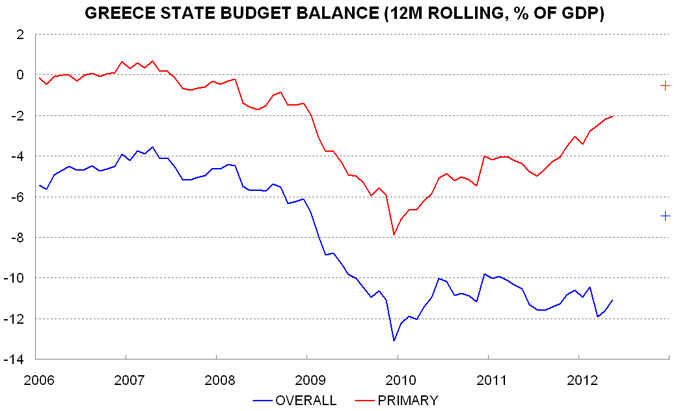Greek primary deficit still falling before elections
Greek budget statistics, if reliable, indicate that the primary deficit (i.e. excluding net interest payments) has declined further in the run-up to the recent elections, despite an ongoing severe recession. The overall deficit has been inflated by a rise in the interest burden but this should reverse following the PSI (private sector involvement) debt restructuring.
The state primary deficit totalled €4.31 billion in the 12 months to May, down from €9.79 billion in the prior 12 months, according to revised data issued today. This represents a fall from 4.4% to 2.0% of GDP – see chart. The recent rate of decline is consistent with achievement of the target in the 2012 Supplementary Budget of reducing the deficit to €1.09 billion or 0.5% of GDP in calendar 2012. (Greece’s IMF programme targets a primary deficit of 1.0% of GDP in 2012 but this is on a wider general government basis including local governments, social security funds etc.)
The overall state deficit, however, was €23.34 billion in the 12 months to May, little changed from €23.46 billion in the prior 12 months, with the fall in the primary deficit offset by a surge in net interest payments from €13.67 billion to €19.03 billion. The shortfall as a proportion of GDP increased from 10.5% to 11.1% because of a contraction in the nominal economy.
The recent debt restructuring will result in net interest payments falling substantially in the remaining seven months of 2012 from their level a year before. Full-year payments are officially projected at €13.05 billion compared with €16.35 billion in 2011. On this basis, the overall state deficit is forecast to fall to €14.14 billion or 6.9% of GDP in 2012, assuming that the primary deficit target of 0.5% is met.
The reduction in the primary deficit from a peak of 7.9% of GDP in 2009 to 2.0% in the latest 12 months is impressive for an economy that has contracted by 16% in real terms from a peak reached in the third quarter of 2008. Recent Greek governments, clearly, have embraced fiscal austerity; taxes, however, may have borne an excessive burden of the adjustment while there has been insufficient structural reform.


Reader Comments